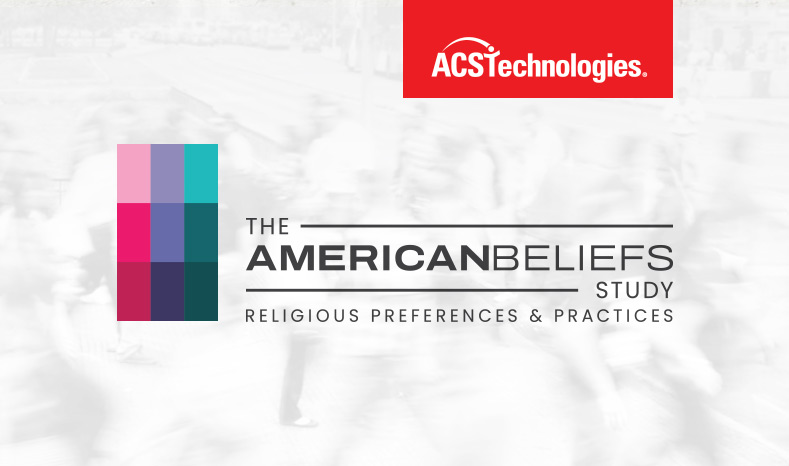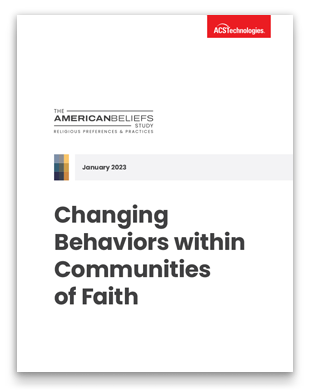Every church or religious congregation has its more active and its less active members, those at the center and those on the periphery, those who attend regularly and those who don’t. These two groups of people are different from each other. The dilemma is real. A church leader might ask…
- Should I design the patterns of church life and ministry specifically to serve Practicing Christians? After all, these are the faithful ones. Why seek to serve those who don’t show up very often?
- Or, should I design the patterns of church life and ministry to seek to attract Nominal Christians back to more active involvement? After all, Jesus did speak of leaving the 99 sheep to seek out the one who was lost. Why give so much attention to those who are stronger in their faith and commitment, when others need more help toward Christian faithfulness?
The authors have personally listened to pastors describe this aspect of leadership as one of the top challenges they wrestle with in ministry.
The American Beliefs Study provides helpful data on this question. From a carefully balanced national sample it surveyed over 9,500 self-described adult American Christians. For purposes of analysis, the Study defined Practicing Christians as those who attended their church or religious congregation at least monthly, and who said their faith was of “Considerable” or “Utmost” significance in their lives. Those who didn’t meet one or both of those criteria were defined as Nominal Christians.
It asked both groups what they would consider important if they were to move and seek to join a new church or religious congregation. Participants rated 33 options on a scale from “Not important” to “Very important.” This produced valuable data on what Nominal Christians are looking for, what Practicing Christians are looking for, where they differ, and where their perceived needs overlap.
First, let’s consider what Practicing Christians saw as most important. Figure 5.c presents their top ten.
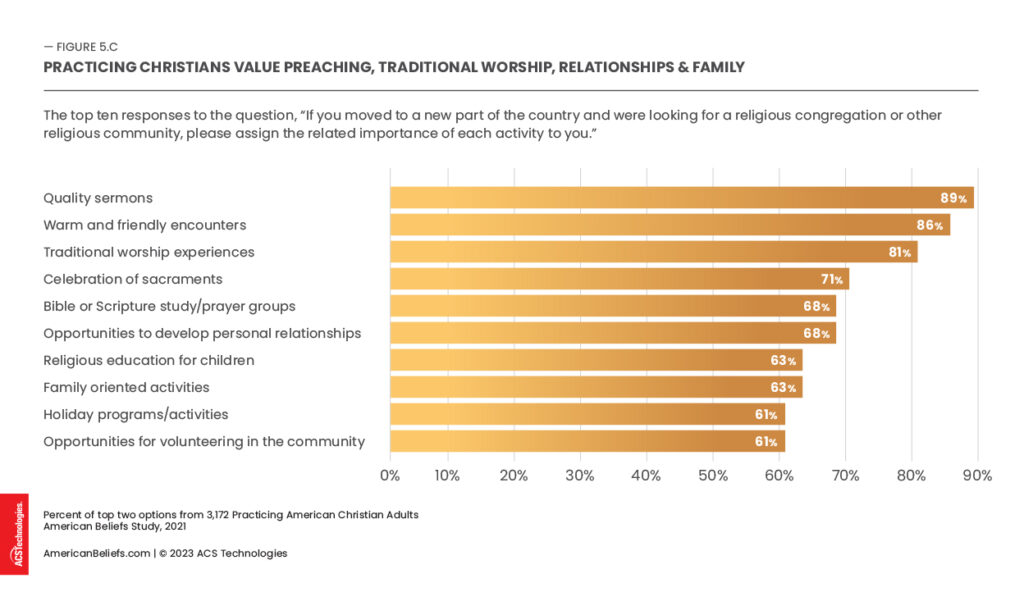
Observations from this data:
- Among all the activities, programs, classes, events, and opportunities offered by a church or religious community, the sermon or homily comes out on top. Practicing Christians are looking for excellence from the pulpit.
Practicing Christians are hungry for fellowship, friendship, and genuine connection with others. “Warm and friendly encounters” scored second on their list, and “opportunities to develop personal relationships” was sixth. Another attribute that could feature both these desires, “Bible or Scripture study/prayer groups,” appears fifth. Combined, these items make a strong case for churches to emphasize small group ministries in some form toward fostering personal encounters, warmth, friendship, and spiritual growth.
- Practicing Christians set a high value on traditional worship. This came out third on their list at 81%, while “Contemporary worship experiences” was 15th on their list at 52%. Protestants place a slightly higher value on traditional worship compared to Catholics. However, there is an apparent strong connection between “traditional worship” and the fourth item on the list “celebrating the sacraments,” especially among Catholics and Practicing Christians in the Boomer and Silent generations.
- In general, family is important to Practicing Christians so that family-friendly churches will be attractive to them. Both “religious education for children” and “family-oriented activities” were in their top ten.
The first thing Practicing Christians look for in a new church is quality sermons.
Next, consider what Nominal Christians said they would look for, if they were seeking a new church. Figure 5.d presents what they said were their top ten, most important items.
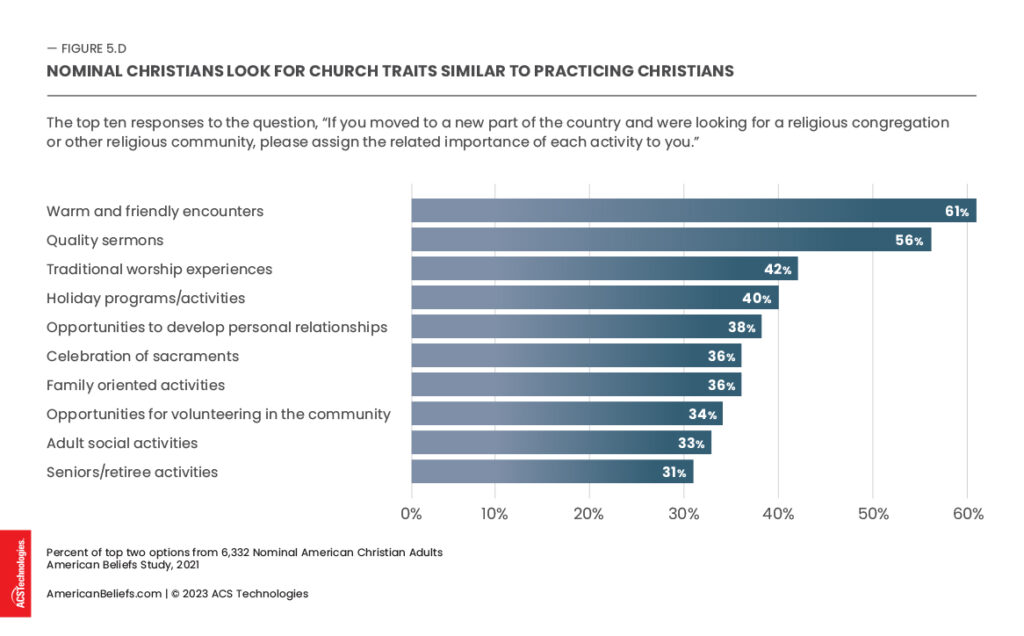
Observations from this data:
- The most striking thing about these two lists is how much they have in common. Eight items appear on both top-ten lists.
- Another clear difference was that each of these items is far less important for Nominal Christians than it is for Practicing Christians. The gap in importance ratings between the two groups was a minimum of 21% (for holiday programs), and as much as 39% (for traditional worship). This likely reflects the lower significance of spirituality in their lives that Nominal Christians admit to in other responses.
- “Warm and friendly encounters” and “quality sermons” ranked first and second for Nominal Christians; for Practicing Christians, they were second and first, respectively.
- Both Nominal Christians and Practicing Christians set “traditional worship experiences” as the third most-important factor they would look for in a new church. Somewhat related, Nominal Christians ranked “celebration of sacraments” as No. 6 on their list, and Practicing Christians ranked it at No. 4.
- Nominal Christians, like Practicing Christians, also seek fellowship, friendship, and personal connection. “Warm and friendly encounters” was most important to Nominal Christians, by a strong margin over the second trait. “Opportunities to develop personal relationships” ranked fifth on the list for Nominal Christians.
- Both groups rank community volunteer opportunities among their top-ten most important traits. Nominal Christians want to help and look for churches that encourage and support that interest.
When it comes to what they look for most in a church, Practicing Christians and Nominal Christians are pretty much on the same page.
This is good news for churches that might think they need to choose between supporting their faithful, regular members or reaching out to those on the periphery. Both groups are looking for many of the same things. Above all, both groups agree on the high importance they place on quality preaching and personal warmth and friendliness in the fellowship.
But there are differences. These are pointed out in Figure 5.e below. This list shows the items with the largest gaps in importance between Practicing and Nominal Christians, excluding those that appear on both top-ten lists. Many more Practicing Christians considered these traits important in a church or religious community they might join compared to Nominal Christians.
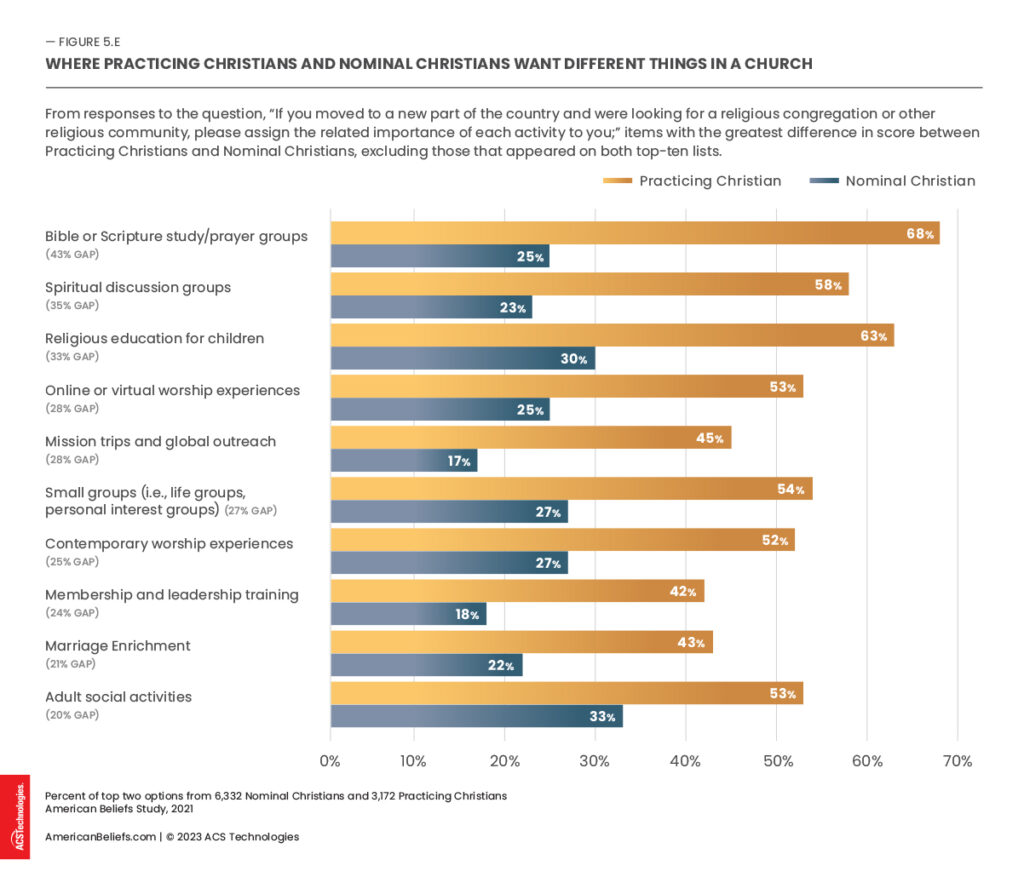
Many Practicing Christians want Bible study groups and spiritual discussion groups, activities that few Nominal Christians seek. Nominal Christians want welcoming encounters and personal relationships, but these scores suggest they feel more comfortable in a large-group setting than in a small-group one.
Small-group ministry can be effective in many ways. But it’s not likely to help attract Nominal Christians to deeper involvement in the church or religious congregation.
On the one hand, both Nominal Christians and Practicing Christians rated “family-oriented activities” as a top ten item. Nominal Christians set their highest value on “warm and friendly encounters,” so perhaps the notion of “family-oriented activities” aligns with that goal. On the other hand, Nominal Christians rated “religious education for children” as being half as important as “family-oriented activities.” This drop suggests that spiritual formation in Nominal families might be less vital than simply interacting within a church as a family unit. Also, the word ‘religious’ appears in other items rated poorly by the Study’s Nominal Christians. Perhaps this term also evokes an unattractive context here, though the Study data is not specific on this point.
Two items that Nominal Christians scored very low on were “membership and leadership training” and “mission trips and global outreach,” at only 18% and 17%, respectively. While they can be important and valuable, they are not likely to attract Nominal Christians to a church.
Despite these differences, in general, there are many significant areas of church life and ministry that both Practicing Christians and Nominal Christians count as either somewhat or very important in seeking out a new religious congregation. The eight items they share on their top ten lists show plenty of common ground. This is where churches can seek to excel and serve both groups well.
Key Findings:
- When it comes to choosing a new church, Practicing Christians and Nominal Christians are looking for a lot of the same things.
- Practicing and Nominal Christians alike want their churches to have quality sermons. And traditional worship, to celebrate the sacraments, and to offer friendship and personal relationships.
- Nominal Christians are not greatly interested in Bible study groups, prayer groups, small group ministries, training or outreach efforts.
- Practicing Christians set a high value on religious education for children. Nominal Christians do not, at least not nearly as much.
- Both Practicing Christians and Nominal Christians want to join churches that offer opportunities for volunteering in the community. For Nominal Christians, these volunteer activities don’t include mission or global outreach.
Ideas for Your Church:
- Don’t accept the idea that a strong choice must be made between serving Practicing Christians well. Or reaching out effectively to Nominal Christians. These two groups are looking for many of the same things.
- Make sure your ministry philosophy includes an emphasis on quality preaching. And setting a warm, friendly, accepting atmosphere in the church. Both the more-active and the less-active members are especially looking for these two things.
- Many areas of ministry are good and important. Like small-group ministry, religious education of children, involvement in global outreach, and leadership training. These areas are not particularly valued by Nominal Christians. That does not mean a church should not pursue these things. It just means a church should not expect activities like these to help attract Nominal Christians to deeper involvement.
About this study
This online study among 14,942 American adults was conducted by Campbell Rinker for ACST from October 2020 through February 2021. Results were balanced by US region, 19 ‘Mosaic’ demographic clusters from Experian. They were weighted by age to align with known population characteristics. The study carries a maximum margin of error of ±1.97% at the 95% confidence level within any US Census region. A comparative 2017 study involved the same size audience.
FREE REPORT
Provides Actionable Data on American Religious Life
In this report, you’ll discover:
- The activity level of Americans in local religious communities and how it has changed over the past decade.
- The most pressing concerns Americans face today, are concerns that will impact how you reach out to your community.
- Good news and bad news about the theological beliefs of Americans. And how they view places of worship in their community.
About the Authors
Dirk Rinker is president and CEO of Campbell Rinker, which has been a leading market researcher for nonprofits since the early 1990s. He has designed and implemented research projects for hundreds of ministries, charities, universities, and museums in the U.S. and internationally. Helping clients understand and act on the attitudes, motivations and perceptions of their valuable constituencies.
Michael Jaffarian is a researcher, writer, and consultant to nonprofits. He and his wife were missionaries for 33 years, serving in Singapore, Virginia, Los Angeles, and England. Most of his ministry has been in global mission research. He has studied, and written on, growth trends among tens of thousands of Christian denominations, globally.

